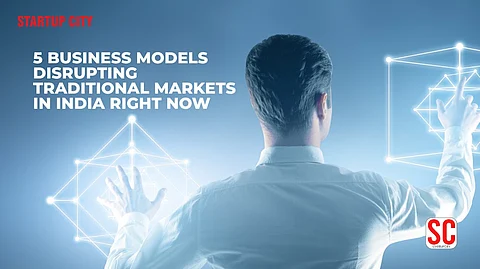

“Disruption is the price of progress. Embrace it, or be replaced by it.”
Let me start with a bold truth: If your business model hasn’t evolved in the last five years, you're already being left behind.
I’m not saying this to scare you. I’m saying it because I’ve seen firsthand — through conversations with founders, investors, and startup builders — how fast the ground beneath Indian industries is shifting.
From fintech to farming, healthcare to hyperlocal delivery — new-age startups are redefining the rules. These aren’t just business ideas. They are revolutions in motion.
So let me walk you through five business models that are actively disrupting traditional markets in India right now. Some may surprise you, others may inspire your next move.
What’s the big disruption?
Direct-to-Consumer (D2C) brands are rewriting the FMCG, fashion, and personal care playbooks. Instead of depending on retail chains and distributors, they’re building lean, digital-first operations that speak directly to consumers.
Why it’s booming:
E-commerce penetration is at an all-time high.
Indian millennials prefer brand transparency and personalisation.
Costs are lower, margins are higher.
Real-world example:
Think of Boat, the audio and wearables brand that grew into a ₹3,000 crore business without a single physical store. Or Mamaearth, now a household name among Indian moms, born out of an e-commerce-only strategy.
What you can learn:
Don’t wait for shelf space — earn screen space.
Invest in digital storytelling and community building.
Personalise products and experiences — customers love it.
What’s the big disruption?
We’ve seen B2B SaaS thrive — but now, subscription models are disrupting B2C segments like education, fitness, content, and even food. Indians are warming up to the “why own when you can access” economy.
Why it’s working in India:
Predictable pricing appeals to value-conscious users.
Low entry barriers.
High customer retention if experience is solid.
Case in point:
Cure.fit launched a monthly fitness subscription, mixing online and offline services.
WhiteHat Jr (for better or worse) disrupted traditional tuition with subscription-based coding classes.
Let me show you how this can apply to you:
Are you in a service-based business? Bundle your offering.
Can you offer premium access, early benefits, or digital support? That’s value people will pay monthly for.
What’s the big disruption?
The Indian farmer, long left behind by tech, is now at the centre of a digital agricultural transformation. AgriTech startups are connecting farmers to markets, data, financing, and weather insights.
Why this matters:
Agriculture still employs over 40% of India’s workforce.
Smallholding farmers lack access to modern tools.
India’s food supply chain is riddled with inefficiencies.
Look at this innovation:
DeHaat provides farmers with everything — seeds, advice, financing, and buyers — on a mobile app.
Ninjacart helps farmers directly sell to retailers, cutting waste and increasing income.
Ask yourself this:
Can your startup solve rural problems with urban tech? If yes, you're tapping into a market ready for disruption and impact.
What’s the big disruption?
COVID-19 was a turning point. Overnight, the healthcare system went remote. Now, telemedicine, at-home diagnostics, and e-pharmacies are redefining the doctor-patient relationship.
Why India is a perfect fit:
Urban-rural healthcare gaps are massive.
Smartphones are everywhere.
People are demanding convenience and privacy.
You’re not alone if you’ve done this:
Ordered medicines from PharmEasy, booked an online consultation with Tata 1mg, or used a wearable to track your vitals.
Here’s the secret…
The future of healthcare is preventive and personalised. Startups enabling early diagnosis, AI-driven health coaching, or 24x7 access to doctors are only scratching the surface.
What’s the big disruption?
Today’s Indian consumer wants everything — groceries, tutors, mechanics — delivered in minutes, not days. Hyperlocal apps are enabling neighborhood businesses to go digital without infrastructure headaches.
Why this matters now:
The 10-minute delivery game is no longer a luxury — it's expected.
Local vendors get access to a wider customer base.
Startups get loyal customers by solving “now” problems.
Examples making waves:
Zepto and Blinkit are changing the grocery game.
Urban Company makes home services as easy as a tap.
What you can do:
If your product or service solves a daily hassle for urban users, consider a hyperlocal delivery or on-demand model. It’s more than convenience — it’s behavior change.
Let’s be real. The next decade belongs to those who question the default, break old systems, and serve new-age customers on their terms.
Every business model I’ve shared above has one thing in common: It rethinks access.
Access to health.
Access to markets.
Access to speed.
Access to personalisation.
"Disruption doesn’t kill industries — stagnation does."
If you're a founder, CEO, investor, or startup dreamer, now is the time to reflect:
Is my model still relevant for tomorrow’s consumer?
Am I using tech to deepen my customer connection?
What industry friction can I solve faster, better, and cheaper?
Disruption isn’t a threat. It’s an invitation.
An invitation to innovate. To serve better. To build bolder.
So I’ll leave you with this:
Whether you're bootstrapping a startup or scaling an enterprise, ask yourself every month — “What would my competition never dare to try?”
Because that’s exactly where the future is headed.